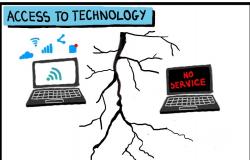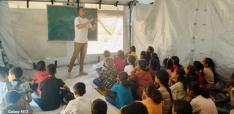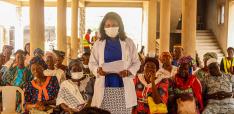Cracks in the Knowledge System: Whose Knowledge is Valued in a Pandemic and Beyond?

Jon Harle argues that we must expand whose knowledge counts and what types of evidence is valued to address pandemics.
Many of the inequities which COVID-19 has exposed – and exacerbated – have been with us for a long time. Setting aside very stark disparities in access to health services, and the ability to maintain decent livelihoods, COVID has shown us once again the processes of exclusion that are baked into the ways in which we produce, communicate and use knowledge.
These are questions of infrastructure – who can study and work and be part of the many discussions taking place? – but also of voice – whose ideas and knowledge are valued?
We often think about how knowledge is produced and used around a particular issue or problem. But if we really want to “build back better” in knowledge terms, we have to look at our systems and how we improve those.
Taking a longer term and systemic view would mean thinking not just about research (i.e. how knowledge is produced by researchers) but also systems of education, and particularly higher education, that create our professional and practitioner communities, and systems of decision-making, that determine how evidence is used in government and elsewhere.
Here are some of the things we need to think about.
Whose knowledge counts and what types of evidence are valued?
In many countries the biomedical sciences have received more attention than the social sciences. We know from other health crises that this is often a problem.
But it is not only a question of disciplinary weight. The source of funding, and the origins of researchers, influence the methodologies used and what comes to count as knowledge. As Budd Hall and Rajesh Tandon argue, methods and ideas about knowledge established by the world’s powerful scientific communities often displace experienced, locally-based partnerships between researchers and communities (“people’s science” was critical to Sierra Leone’s Ebola response, for example).

COVID-19 has reminded us that the question of whose knowledge also has a darker side – one that connects instantly to the racism that infects much of our discourse on knowledge. As Dr Simukai Chigudu argues, a “pandemic outbreak” narrative set in early, with Africa as a continent of impending tragedy, and the West a source of expertise and science. It was followed by a rush of Northern experts offering policy prescriptions. Meanwhile, Ghanaian scientists sequenced the genomes, new prototype ventilators were developed by Kenyan and Ugandan engineers, Senegalese scientists developed a low-cost testing kit, the African Academy of Scientists rapidly crowd-sourced a continental research agenda, and the Africa Evidence Network has curated information for decision makers in the region.
What do decision makers need and what systems have they got to make use of it? AKA – supply vs usefulness
Discussion often focuses more on the supply of ideas and knowledge than how to use them in practice, or even what demand there is for evidence in the first place. Coupled with weaknesses in systems for using evidence (in decision making, say), this can mean that certain types of knowledge dominate. Experts who are better connected to policy spaces or to the media are likely to be privileged in the debate. Insights on how needs differ according to gender, age, ethnic background, socio-economic status or ability/disability etc are likely to be missing at critical points.
If organisations lack the structures for commissioning or evaluating evidence, then decision makers will be forced to rely on what they get, when they get it, rather than being able to generate what they need when they need it. It probably looks very different to someone working in local government too. They might be unable to access disaggregated data on which to base their own decisions, or lack the resources and capacities to generate their own.

Who can access digital knowledge and tools? Who can work and who can study?
Today’s knowledge systems rely on digital connections, and COVID-19 has thrown that into sharp relief as many more interactions have moved online. That opens up new opportunities for inclusion – participation is no longer restricted by the time and money to travel and (theoretically at least) it becomes possible to participate in professional spaces alongside domestic responsibilities (though not surprisingly this is evidently gendered – see here, here and here).
But going digital also creates new exclusions. It’s much harder to participate when your connectivity is poor or comes at greater personal expense. As this visualisation shows, people in Malawi and Benin pay upwards of $27 per gigabit, compared to $4 in Germany or $1.39 in the UK (it’s lowest in India, at less than 10 cents). Even for those that can get online, choices must be made about which meetings and webinars and learning opportunities to prioritise. Ravi Murugesan calculates that if you ask someone to watch a 10-min YouTube video (at 480p quality) you’re also asking them to spend 100mb of their data. In Malawi that would be about $2.7 – in Ethiopia 24 cents and in Uganda 16 cents. In Ghana and South African universities have persuaded telecom companies to zero-rate academic and educational sites in response.
When we rely so much on digital networks we also need to think about the knowledge that is rendered inaccessible by the languages in which we’ve digitised it, or even invisible by its complete lack of digitisation.
Questioning norms and what counts as excellent research
Travel of Northern researchers and experts to work in the South has been disrupted, opening up new spaces for Southern researchers and experts to work in the meantime. There have been myriad examples of Southern professionals organising remotely to debate issues and discuss solutions (including here and here), and many using existing mechanisms or projects to provide support in online teaching and assessment (see PedaL and E/merge Africa). In the process of adapting research processes, some researchers have reflected on the extent to which Northern researchers and “capacity builders” are needed – or not.
But further disruption is needed too. Any “better” future will only happen by unsettling the prevailing structures for creating, contesting and deploying knowledge. More Southern researchers doing the work isn’t enough if that work is still constrained (explicitly or implicitly) by the norms and metrics which decide what “excellence” and “quality” look like. Those tend to be set in the North and are then pushed into Southern systems, directly or indirectly as a result of funding. For Southern research to prosper, and for knowledge to be of greatest value to Southern communities and societies – and to the world at large – we need to value research differently, as Erika Kraemer-Mbula and colleagues have argued. IDRC’s Research Quality Plus has shown that, when judged against relevance as well as rigour, much Southern-produced research outperforms that done by Northern teams.
Most critically, we need to recognise that inequity within knowledge systems is not an accident. It is fundamentally about power, and it therefore follows that to address these inequities we must be prepared to disturb those asymmetries – and to be ready to change our own role.
See more, in the full paper (In)equitable knowledge systems: before, during and beyond a pandemic.
This first appeared on the From Poverty to Power blog.


